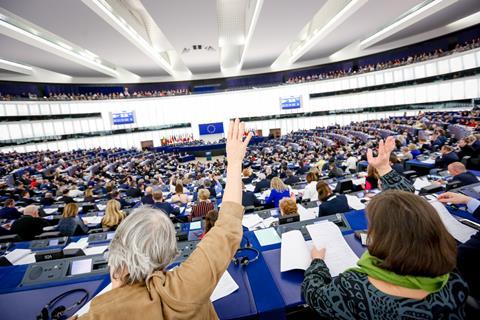The European Parliament today approved the final text for the EU’s Corporate Sustainability Due Diligence Directive (CS3D).
In a vote at plenary, members of the European Parliament (MEPs) gave their blessing to the law, which has been significantly watered down by the European Council in recent months.
The main concessions, introduced during unexpected last-minute political negotiations back in March, related primarily to the scope of the Directive. MEPs have now signed-off on an agreement which means the law will only apply to very large companies.
Specifically, the first phase of the legislation would see firms with more than 5,000 employees and €1.5bn in net turnover required to undertake environmental and social due diligence on businesses within their value chains, and act to mitigate any harms they identify during that process.
They would also have to develop and implement climate transition plans.
Smaller companies will be phased in over time so that, by 2029, all those with more than 1,000 employees and €450m in net turnover will be covered.
The law will apply to companies with significant operations in the EU, even if they are headquartered in another jurisdiction. High-risk sectors have been removed from scope.
In addition, CS3D introduces provisions to make it easier for stakeholders to sue companies for failing to do adequate due diligence.
Finance
Another big concession to have been approved by Parliament today relates to how CS3D applies to the finance sector.
Following intense lobbying last year, the sector was exempted from most of the Directive’s due diligence requirements back when the original legal agreement was approved in December.
It was argued that investors could not reasonably conduct due diligence on businesses in their portfolios and lending books, and had little leverage over those firms when it came to mitigating harms.
But, as part of the compromise, co-legislators made an official commitment to reconsider the inclusion of the finance sector in future, once there was a better understanding of how the law worked in practice.
That promise was withdrawn during the latest negotiations, and was therefore not part of the text signed-off by Parliament today.
“Financial services firms are still included in the scope of the CS3D,” explained Julia Grothaus, head of litigation, arbitration and investigations for the German arm of law firm Linklaters.
“However, when it comes to the Directive’s due diligence obligations, they are only responsible for their own operation and upstream business partners, meaning their investment and lending activities are excluded from CS3D obligations.”
Grothaus noted that this distinguishes the Directive from the EU Corporate Sustainability Reporting Directive, under which financial institutions are required to explain the environmental and social performance of their downstream value chain.
There is still a chance that the finance sector will end up being more thoroughly covered by CS3D in the future, though, pointed out Julia Otten, a Brussels-based policy officer at purpose-driven law firm Frank Bold.
“There is a review clause in the text that requires the European Commission to produce a report on this topic within two years,” she explained, referring to a requirement for legislators to publish an evaluation of the potential to strengthen the rules for the finance sector “at the earliest possible opportunity after the entry into force – no later than two years”.
“So there is still an open track to require financial institutions to conduct full due diligence in the future, it’s just not as strong as it was,” said Otten.
In the meantime, there is also the possibility that member states could add the investment industry back into that part of the legislation when they transpose it into domestic law – which they also have two years to do.

While the Directive is rigid about what due diligence must look like, it is more flexible on the scope of the rules and how they are enforced at national level.
“For example, the Dutch were very keen on including finance during the negotiations,” said Otten. “So it’s possible they might consider adding it back in.”
However, given the political mood in Europe at the moment, and the desire of many countries to create a level playing field for due diligence supply chain laws across the bloc, it seems unlikely that they will pursue this any time soon.
Next steps
Today’s vote was a major milestone in the adoption of CS3D – it means that two of the three EU legislative bodies have accepted the proposal just in time to keep it alive.
But the last hurdle is likely to be the toughest: the legal text has to be signed off by the European Council, which has been its biggest critic throughout.
On 15 May, there will be a meeting of Coreper to discuss the final agreement, followed by a meeting at the most senior levels of Council later in the month, for formal approval.
The compromises made in March have caused some of the Directive’s key detractors to soften. Sweden, for example, has said it will support the new version. Others, including parts of the German coalition, remain steadfastly opposed to the law.
If Council doesn’t rubber stamp it next month, the law will essentially be dead.
“The file is past the negotiation stage, so if it fails to get through the process in the next few weeks, there will be no time to do anything this side of the European elections,” Otten noted.
That would leave it in the hands of the next Parliament, who would need to decide to revive the file and restart the negotiations. But, with a swing to the right widely anticipated in this summer’s elections, few people expect there to be appetite for a flagship sustainability law like CS3D.
Read the digital edition of IPE’s latest magazine
























